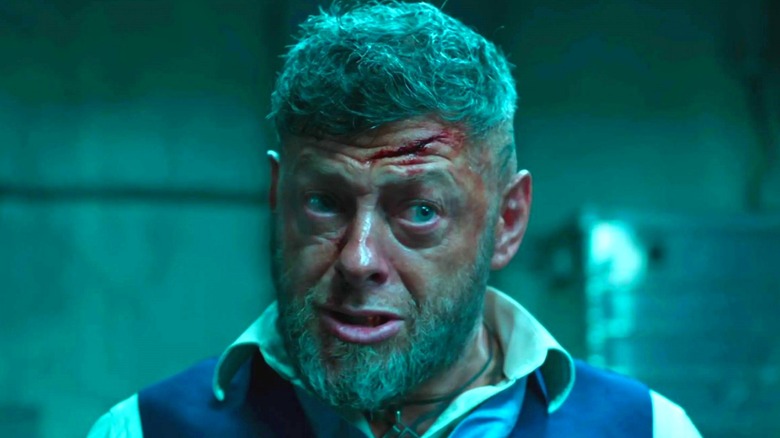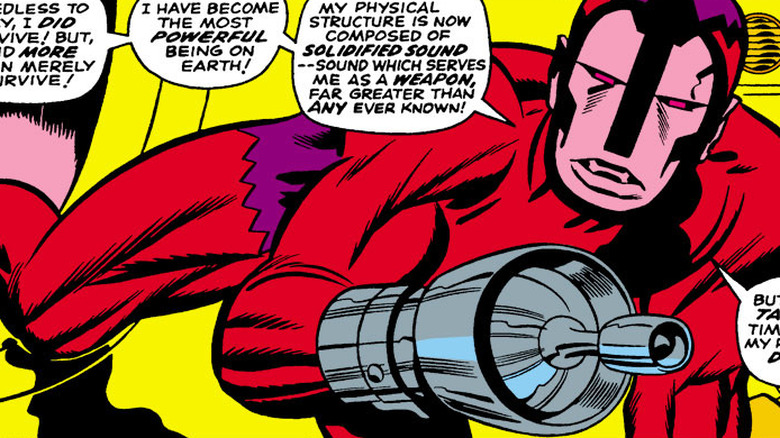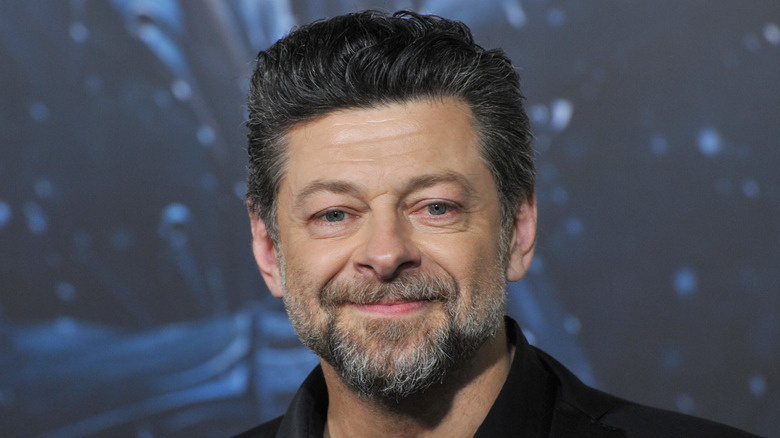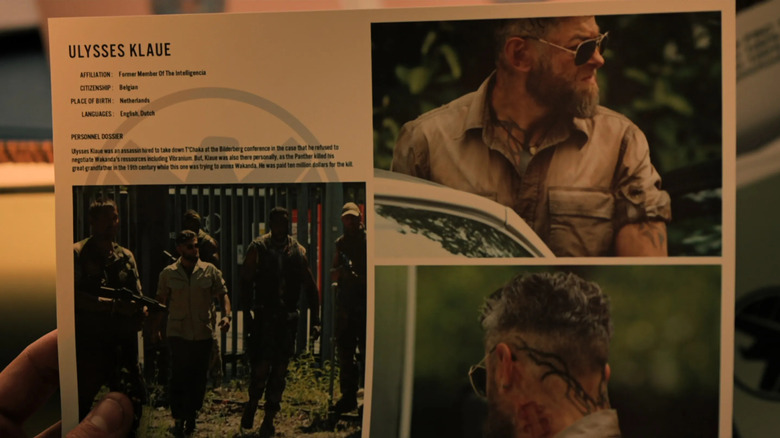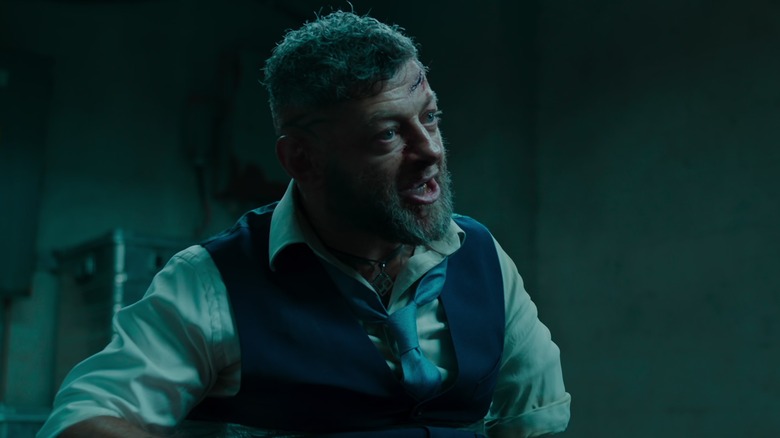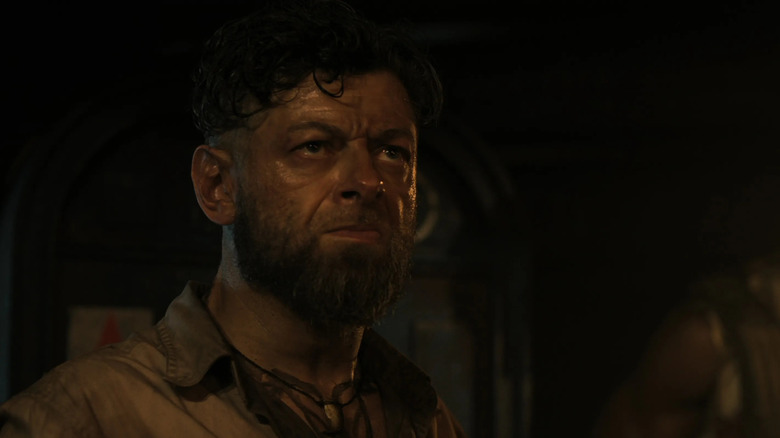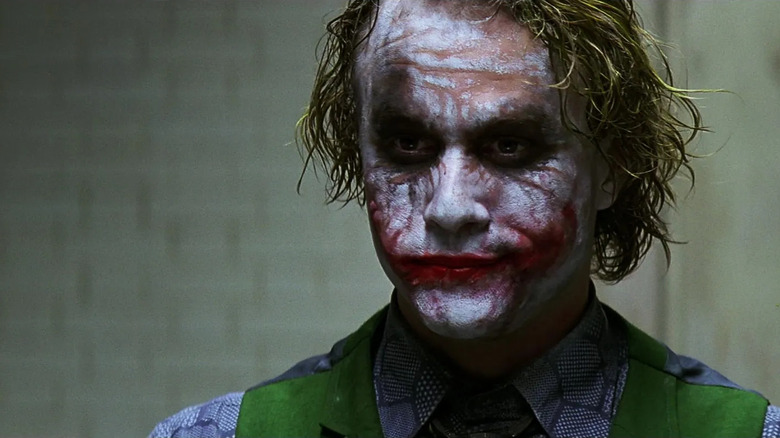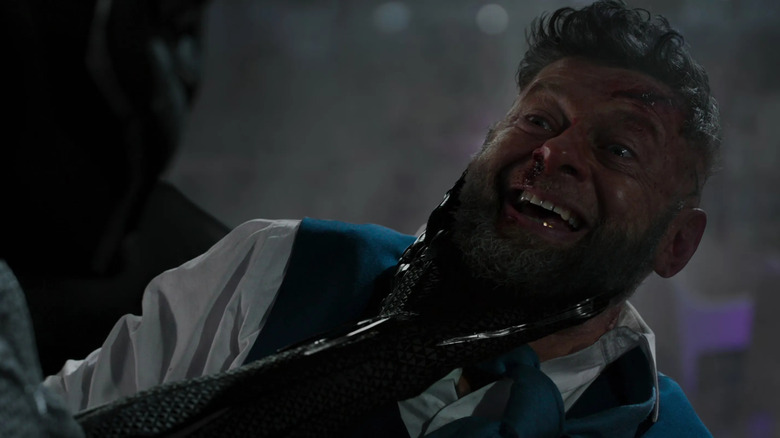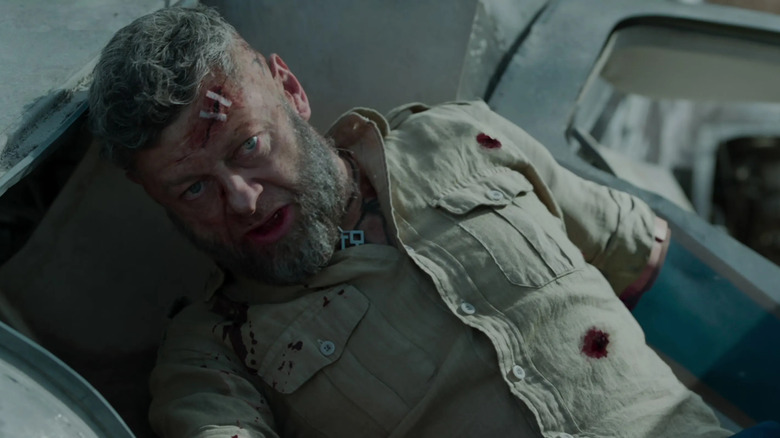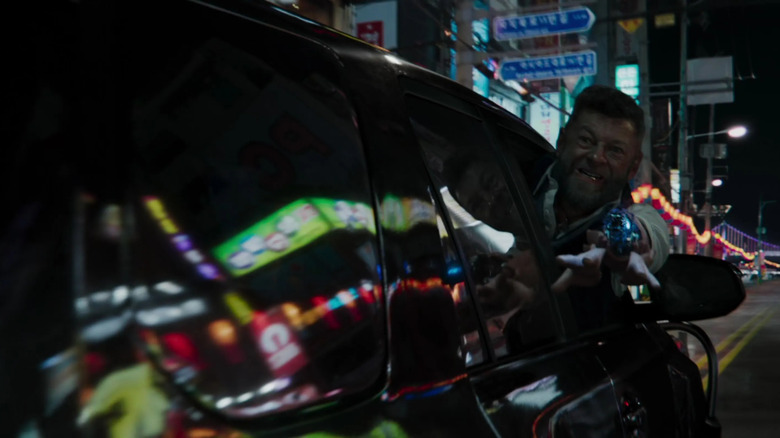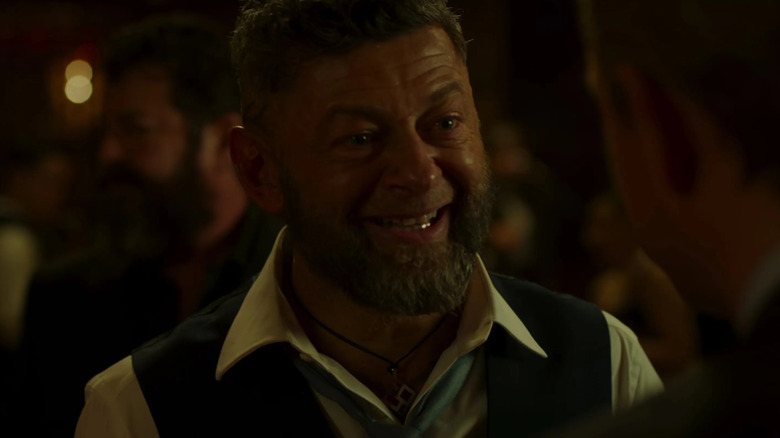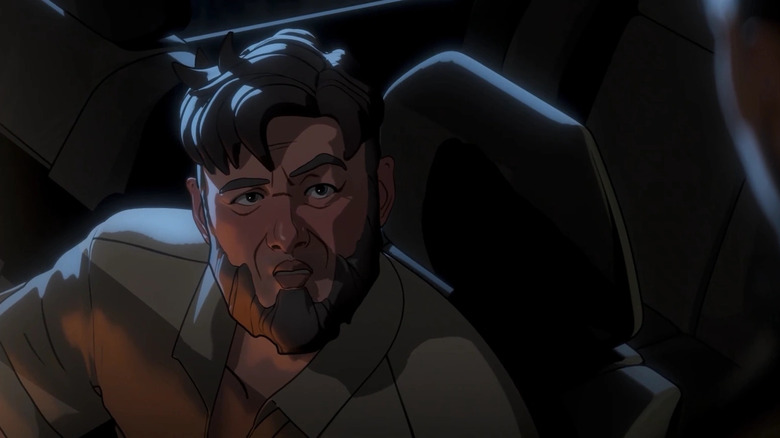The Untold Truth Of Klaue In The MCU
When Marvel Studios released "Avengers: Age of Ultron" in 2015, they introduced a terrifying new villain to the MCU: the A.I.-peacekeeper-gone-wrong known as Ultron. Among the chaos of Ultron's cybernetic rampage, however, "Age of Ultron" brought in another — slightly less terrifying — new villain.
Ulysses Klaue will be a very familiar face to long-time fans of the Black Panther. Known in the comic book universe as Ulysses Klaw, this monstrous enemy of the Wakandan people has been a thorn in the side of King T'Challa and company ever since his debut in 1966's "Fantastic Four Vol. 1 #53." Suitably, his MCU counterpart is just as devious, having gone face-to-face with the Avengers in "Age of Ultron" and the Wakandans in 2018's "Black Panther."
Considering he was never the main antagonist in either of his on-screen appearances, you might be forgiven for not knowing all that much about the MCU version of Klaue. Fear not, though — because we've got the lowdown on the Black Panther's oldest and most dangerous enemy. This is the untold truth of Klaue in the MCU.
The origins of Ulysses Klaw
In the main Marvel comic book continuity known as Earth-616, Ulysses Klaw has been an important character and opponent to King T'Challa for over 50 years. He first appears in "Fantastic Four Vol. 1" #53 and #56, a run of comics that, along with "Fantastic Four Vol. 1" #52, also marks the debut of T'Challa himself. During this storyline, Klaw is revealed to be the mastermind behind a spate of attacks on the hidden kingdom of Wakanda. After successfully managing to transform himself into a being of pure sound, Klaw is defeated by Marvel's First Family and hauled off to prison. Of course, that's not the end of Klaw's misdeeds — not by a long shot.
Over the ensuing decades, Klaw joins the supervillain team known as the Masters of Evil, takes on the Avengers on multiple occasions, falls under Doctor Doom's influence, battles Daredevil for control of Hell's Kitchen, and much, much more. One thing that never changes, though, is his hatred of the Wakandans.
In 1993's "Fantastic Four Unlimited" #1, T'Challa learns that a Nazi colonel named Ulysses Klaue once crash-landed in Wakanda and attempted to co-opt the kingdom's vibranium resources for the good of the Third Reich. Although King T'Chaka eventually drove Klaue out of his homeland, T'Challa theorizes that the young Ulysses Klaw must have heard wondrous tales of Wakanda at his father's knee, thus driving his obsession with the hidden African nation. That obsession inspires nearly all of Klaw's dastardly schemes in the 616 universe — and so it must have seemed only natural to bring this same trait to the MCU version of the character.
Marvel finds a Klaue
In a 2014 interview with Variety, actor and motion-capture legend Andy Serkis confirmed that he had joined the crew of the upcoming "Avengers 2." Serkis told Variety that he had taken on the role of "performance capture consultant" on the movie, explaining that he was working closely with Mark Ruffalo — presumably for his CGI-heavy scenes as the Hulk. But Serkis also revealed that he was playing an actual on-screen role in the movie, too. Rumor soon spread that the character in question was an MCU version of Ulysses Klaw, with Serkis' role being finally confirmed by the first trailer for "Age of Ultron." After the second "Avengers" flick, Serkis returned to play Klaue in a more substantial capacity for "Black Panther."
It's probably isn't an exaggeration to say that there's no actor in Hollywood quite like Andy Serkis. Having been propelled to fame for his portrayal of Gollum in Peter Jackson's "The Lord of the Rings" trilogy, Serkis became known as the go-to guy for compelling motion-capture performances. He has since donned a skintight suit for projects such as "King Kong," the "Planet of the Apes" series, the "Star Wars" sequels, "Mowgli: Legend of the Jungle," and more. In 2011, he co-founded Imaginarium Studios, the motion capture production company that he later brought in to help with "Age of Ultron." Although he didn't contribute a mo-cap performance to the role of Ulysses Klaue — as you may have noticed, Klaue is human — the role nevertheless proved to be yet another impressive notch in Serkis' genuinely stellar career.
Secret history
Although Klaue only made his MCU debut in "Avengers: Age of Ultron," a number of easter eggs have offered fans a glimpse into the character's past. In 2015, a number of Marvel fans discovered (via MovieWeb) that, when Tony Stark pulls up a file on Klaue during "Age of Ultron," you can just make out a quick biography of the villain the team are about to face.
"Ulysse Klaue," it reads, "was an assassin hired to take down T'Chaka at the Bilderberg conference in the case that he refused to negotiate Wakanda's resources including Vibranium." So far, so Klaue, right? Considering T'Chaka is the king of Wakanda at this point in the MCU timeline, it definitely tracks that he would have encountered Klaue on more than one occasion. (It's worth pointing out, too, that T'Chaka seemed to be on Klaue's trail even as far back as the '90s-set prologue to "Black Panther.")
But the file on Klaue offers another intriguing easter egg for comic book fans. "Klaue was also there personally," it continues, "as the Panther killed his great-grandfather in the 19th century while this one was trying to annex Wakanda. He was paid ten million dollars for the kill." This appears to be a reference to Klaue, a 19th century Dutch explorer from the 616 comics who, according to "Black Panther Vol. 4" #1, attempted to conquer Wakanda before being defeated and killed by that era's Black Panther.
Enemy of Wakanda
It's as clear as day that Klaue's entire personality is driven by his relationship with Wakanda. Even during his earliest appearance in "Age of Ultron," Klaue is causing trouble for the Wakandans, selling their highly precious resource vibranium to the highest bidder — in this case, Ultron. "Black Panther," meanwhile, takes Klaue's villainy to a whole new level. Klaue spends pretty much the whole movie relentlessly pursuing Wakanda's vibranium, stirring up a whole heap of chaos in the process.
The Klaue of "Black Panther" is the ultimate adversary — not only to T'Challa, but to the nation of Wakanda itself. Considering his colonial roots (and Nazi parentage, if you're considering the comic books), you could feasibly argue that Klaue represents a hyper-violent depiction of imperial greed on the African continent. This is a guy whose sole purpose is to show up, kill Wakandans, and steal whatever he can get his hands on.
Klaue's racism is something that Andy Serkis considered when he took the role, roo. During a media visit to the set of "Black Panther," Serkis revealed that the decision to give the character a South African accent was very much rooted in his politics. "It was quite a smart decision, I think," Serkis told ScreenRant. "It gives him a real edge. Also, because of the relationship to Wakanda as well, a misunderstood African nation, it fits very well politically that he was of South African descent at a time when, of course, he grew up through Apartheid."
Lightening the mood
Attentive viewers will have noticed that, between the events of "Age of Ultron" and "Black Panther," Klaue undergoes something of a personality shift. The "Age of Ultron" version of the character is devious, sure, but he's also more suave and serious than the character he later becomes. By "Black Panther," Klaue is a full-blown agent of chaos with a border-line unhinged love of death and destruction; he also appears to have become something of a jokester.
Apparently, this was an intentional move on the filmmakers' parts. During an interview with Den of Geek in the run-up to the release of "Black Panther," Andy Serkis explained how he and director Ryan Coogler decided to evolve Klaue's character. "When Ryan took it on," he said, "he just wanted to have more fun with it, really. We'd already set [Klaue] up as a slightly kind of left field ... dangerous, but kind of slightly bizarre sense of humor and slightly quirky character. Then Ryan really took it to town and we really played with it and invented stuff as we were going along."
Serkis had previously alluded to this after being asked about giving Klaue new qualities for "Black Panther." "In this one," Serkis explained to Collider, "there's quite a lot more humor, actually, which is great. It's that thing where you don't know whether he's enjoying this, or playing at enjoying this, whether he's really laughing or just hiding behind it."
The Joker factor
Andy Serkis' hugely underrated portrayal of Klaue in "Black Panther" might bring to mind a similar (and far more infamous) comic book villain: The Joker. Certainly, both characters share a number of traits. They love chaos, for one, and they're not averse to making a few jokes in the heat of battle. They've both got a creepy laugh, they both act as nemesis to a shadowy superhero — heck, they even share similar interrogation scenes. So could Ulysse Klaue be described as the Black Panther's Joker?
Well, maybe. But the Clown Prince of Crime certainly wasn't on Serkis' mind during filming. Having been asked about the similarities between each character in an interview with ComicBook.com, Serkis insisted that they were totally unintentional. "I didn't think of Heath Ledger's Joker," he said. "No, I didn't think of it at all because you're in the world of creating your own character. Sometimes, previous actors, you can get inspired by them, but no."
Funnily enough, however, there is another "Black Panther" star who claims to have been inspired by the Joker. During an interview with Empire (via MovieWeb), Michael B. Jordan explained how Heath Ledger's iconic turn drove him to perfect his portrayal of Erik Killmonger. "You look at Heath Ledger's performance," Jordan said, "in 'The Dark Knight,' and it's like, 'Wow'. I want to try to get something like that. [...] Just trying to find my place amongst those roles, and strive for that, even if I don't make it."
Stunts and fights
For some actors, making a Marvel movie is anything but an easy ride. You're sworn to total secrecy on pretty much every aspect of the role, you have to undertake what probably feels like a solid decade's worth of press touring, and you run the very real risk of accidentally committing yourself to a six-part Disney+ series. Aside from all that, though, you've also got to get through a whole lot of stunt work.
For "Black Panther," Andy Serkis got his hands dirty for a number of Klaue's fight scenes — and not all of them went well. In an interview with PeopleTV (via The Wrap), Serkis revealed that one in particular made him believe he was "literally going to die." According to Serkis, the scene took place during the extended South Korea sequence in which Klaue attempts to escape from the clutches of T'Challa. During one fight, Chadwick Boseman accidentally kneed Serkis in the chest with too much force. "I thought like he broke my ribs on the very first take," Serkis said.
Worse still, they repeated the scene some 30 times, including a stunt in which Klaue's car crashes and rolls over. "I'm going to die," Serkis remembered. "I thought, I am literally going to die here."
To be honest, a press tour probably doesn't seem too bad in comparison.
The death of Ulysses Klaue
If you've seen "Black Panther," you'll know exactly what happens to Ulysses Klaue — and even if you haven't, you can probably take a decent guess. After teaming up with Erik Killmonger to steal and sell a load of vibranium, Klaue is asked by his new ally to fly them into Wakanda; when Klaue refuses, a firefight breaks out. In the end, Killmonger (having been revealed to be a Wakandan himself) puts a bullet in Klaue's head. So, yeah, not a happy ending for Klaue.
Even "Black Panther" director Ryan Coogler has expressed regret over the need to kill off Klaue. A few months after the movie was released, Coogler told The Toronto Sun that "I like [Klaue]. I was bugged by having to do that. It's tough when you have to kill characters off and I really did love that character."
Nevertheless, Coogler also admitted that, for the good of the story, Klaue simply couldn't be allowed to live. "I love Andy," he continued, "he's a lovely person. "But again, it's one of those things where when you've got so many people in a movie, some of them have to go."
Luckily for fans of the MCU's take on the Black Panther's nemesis, the 2018 "Black Panther" movie wasn't the last time Klaue would turn up looking for trouble...
Sonic upgrades
In a world inhabited by flying metal men, super-strong war heroes, giant green monsters, and literal Norse gods, you'd be forgiven for thinking that Ulysses Klaue feels a little underpowered. In "Age of Ultron," he has little more than a sidearm and a story about cuttlefish with which to battle Earth's Mightiest Heroes. Still, he's not totally adrift. Aside from commanding a small army of henchmen, Klaue also has a supply of vibranium at his disposal, as well as enough bravado to throw Quicksilver and Scarlet Witch off their game. Not that this is enough to stop Ultron from accidentally cutting his arm off, of course.
By the time "Black Panther" rolls around, Klaue has given himself a nifty upgrade in the form of a sonic disruptor that acts as both a prosthetic limb and a deadly weapon. This, of course, is a reference to the original comic book character, who wields a similar (albeit far more powerful) weapon. In an interview with ComicBook.com, Andy Serkis suggested that a newly-embittered Klaue spent his post-"Age of Ultron" days converting an old mining tool into his new weapon. This story is alluded to during Klaue's interrogation in "Black Panther," when Klaue offers to do the same for CIA agent Everett Ross.
Before long, Klaue is given the opportunity to put his sonic disruptor to good use, although T'Challa gets the better of him anyway. Still, though — at least he stood a chance, this time.
Klaue's mixtape
In "Black Panther," Everett Ross encounters Ulysse Klaue at a casino in South Korea; Ross is there to buy vibranium for the U.S. Government, and Klaue is there to sell it. When they meet each other, Ross makes a quip about Klaue's henchmen. "That is quite the entourage," he says. "You got a mixtape coming out?" Klaue, being Klaue, replies: "Oh, yeah, yeah. Actually, there is one. I'll send you a SoundCloud link if you'd like."
Of course, this is basically just a throwaway gag that serves to demonstrate the casual animosity between these two characters. That said, if you've ever wondered what might actually be on Klaue's mixtape, fear not — because you're not alone.
When Andy Serkis and Martin Freeman sat down with GamesRadar to discuss "Black Panther," they offered up their own ideas as to what tracks Klaue could have included. "Everything from Mozart to jazz, actually." Serkis said. "And Pink Floyd." Meanwhile, Freeman suggested that Klaue might listen to "a little bit of Boer folk music" every now and again. Say what you like about Klaue, but the dude's got eclectic taste.
What If?
Klaue may have met an ignominious end during the events of "Black Panther," but he made his sort-of-return in the 2021 animated series "What If?" in which he was once again performed by Andy Serkis. The sixth episode of the series asked what might have happened if Tony Stark had been rescued by Erik Killmonger during the events of 2008's "Iron Man." The answer, of course, being "nothing good."
Klaue becomes involved in the episode's plot when Stark, in need of a supply of vibranium, sets up a meeting with the black market arms dealer. Colonel Rhodes is sent to barter for the precious resource, but T'Challa interferes in an attempt to stop the deal, spurring Killmonger to kill him and frame Rhodes for the muder. Later in the episode, Klaue drives Killmonger to the Wakandan border, where — much like during "Black Panther" — Killmonger betrays and kills him, before offering his body as a gift to the Wakandans.
Some viewers might have been a little disappointed that Klaue meets such a familiar fate in "What If?" For example, CBR.com described the episode as a "waste" of "the MCU's shadiest villain." But something has to be said for the cosmic justice in Klaue's apparently immutable destiny, as well as his apparent inability to escape Wakandan revenge — no matter what reality he inhabits.
Into the future
Considering his surprise reappearance in "What If?" you might wonder whether Klaue could pop up again in the MCU sometime soon. Everyone knows how impermanent death can be in the world of superheroes, and barring any more "What If?" cameos, there are a number of upcoming features and shows in which Klaue might appear.
The most obvious would be the upcoming "Fantastic Four." Despite being a sworn enemy of the Black Panther, Klaue made his debut in a Fantastic Four comic, and he seems to have as much hatred for Marvel's First Family as he does for the Wakandans. His association with sonic powers would make him a prime candidate to appear in the upcoming "Echo" series on Disney+, as well as the much-rumored and arguably inevitable "Daredevil" series that will follow it. And then, of course, there's "Black Panther: Wakanda Forever," which would provide ample opportunity for Klaue to make a comeback.
Unfortunately, all this speculation might be for nothing, as it does seem like the Marvel Studios bigwigs are done with the character. In an interview with ComicBook.com, producer Nate Moore insisted that Klaw is never coming back. "He's dead, dead," Moore said, adding that the character's short-lived story was part of the appeal to Andy Serkis. "And we only like to tell as much story as we have for a character."
Still, that interview took place long before the release of "What If?" — so who knows what the future might hold for this devious enemy of the Wakandan people?
